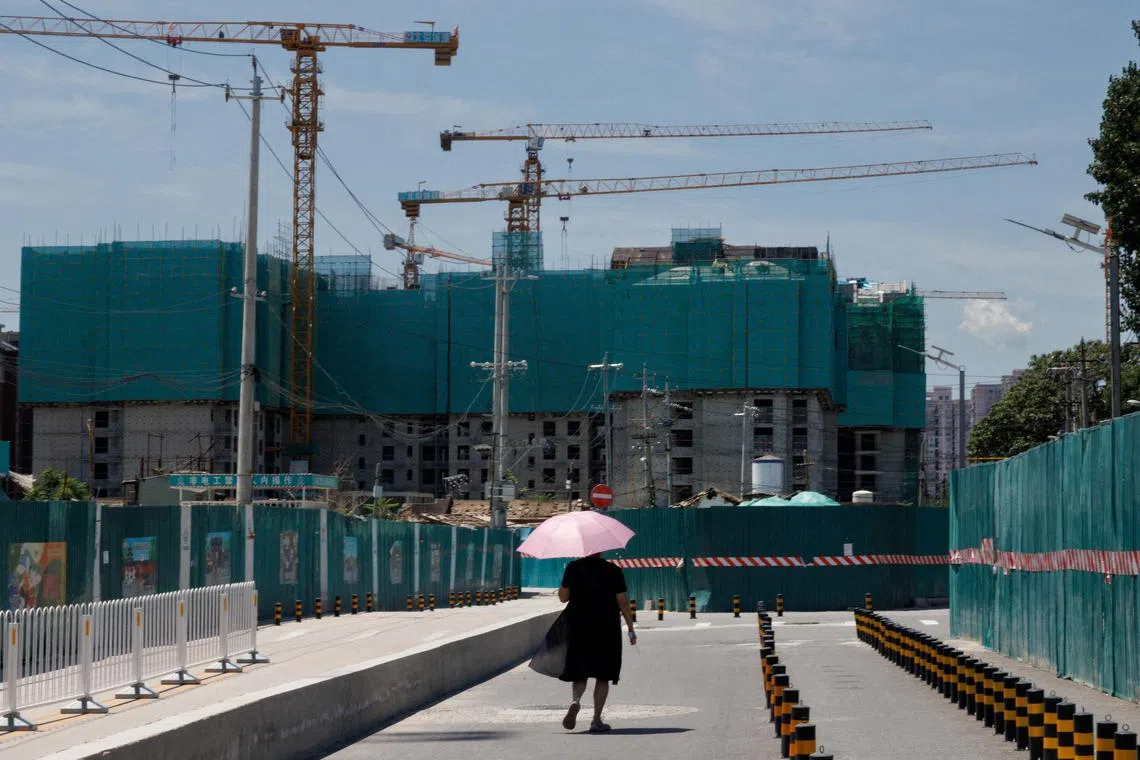China signals more economic aid after property debt relief
Sign up now: Get ST's newsletters delivered to your inbox

China's financial regulators said the aim of the loan relief measures is to ensure the delivery of homes that are under construction.
PHOTO: REUTERS
SHANGHAI – China signalled more economic support measures are imminent after the authorities took a small step towards supporting the ailing property market by extending loan relief for developers.
Top state-run financial newspapers ran reports on Tuesday flagging the likely adoption of more property supportive policies, along with measures to boost business confidence.
Earlier, financial regulators stepped up pressure on banks to ease terms for property companies by encouraging negotiations to extend outstanding loans. The People’s Bank of China (PBOC) and National Financial Regulatory Administration (NFRA) said in a joint statement on Monday that the aim is to ensure the delivery of homes that are under construction.
Some outstanding loans – including trust loans due by the end of 2024 – will be given a one-year repayment extension, the statement said. Previously, the more-generous loan terms were to be applied only to loans that were due by late May 2023, as part of a 16-point plan unveiled late last year.
“The move signals that regulators consider it’ll take a year and a half more for developers to see their fund raising and operations normalise,” said China Index Holdings research director Liu Shui. “It means the housing market downturn and developer risks have been worse than they expected earlier.”
Loans due by the end of 2024 account for about 30 per cent to 40 per cent of developers’ total debts, said Mr Raymond Cheng, head of China and Hong Kong research at CGS-CIMB Securities, adding that the measures may help ease developers’ liquidity in the short term if implemented.
China’s real estate crisis is stifling a recovery
To revive the market, regulators have long been expected to come up with more supportive policies. People familiar with the matter said in June that China is considering a new basket of measures, such as reducing down payments in some non-core neighborhoods of major cities, lowering agent commissions on transactions and further relaxing restrictions on residential purchases.
China Securities Journal, the country’s flagship securities newspaper, said on Tuesday that China is expected to “accelerate” policy roll-out to promote the stable and healthy development of its real estate market. In a separate report, it also said the government may introduce measures to boost business confidence among private, state-owned and foreign firms following officials’ recent meetings with company executives.
Meanwhile, Shanghai Securities News cited Golden Credit Rating chief macro analyst Wang Qing as saying that policymakers may take further measures such as relaxing property purchase and mortgage rules as well as cutting home loan rates to achieve a soft landing of the real estate market.
A Bloomberg Intelligence gauge of Chinese property shares rose 1 per cent on Tuesday afternoon, paring this year’s decline to 26 per cent. Iron ore futures in Singapore rose as much as 2.5 per cent.
Besides property, other facets of the economy are also showing weakness. Consumer spending is sluggish, exports are flagging and local government debt is soaring. Data on Monday showed that the nation’s consumer inflation rate was flat in June,
In the statement, the PBOC and NFRA said project-based special loans provided by commercial banks to developers before the end of 2024 will not be classified as higher risk. They also urged financial institutions to ramp up support to ensure the delivery of construction projects.
“Today’s easing, which focuses on developer financing, is far from enough to stabilise the sector,” Dr Larry Hu, head of China economics at Macquarie Group, wrote in a note to clients. “After all, credit risk for banks will remain elevated if the housing market stays weak.”
Nomura Holdings chief China economist Lu Ting said a “bazooka” package that can quickly turn the property sector around is not likely. BLOOMBERG


